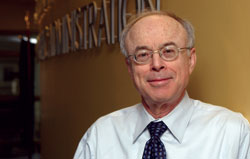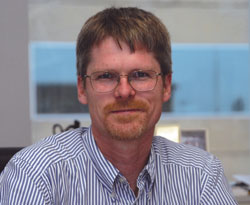Fostering Research, Practical Answers
The GW Institute of Public Policy explores issues of interest
to both the scholar and the layman.
By Zak M. Salih
How do a state’s policies affect its cities? Researchers
at GW’s Institute of Public Policy (GWIPP) recently
undertook an extensive research project to uncover any correlation
between the administration of state government policies and
the health of a particular city. With funding from the Fannie
Mae Foundation, they looked at particular changes in per capita
income, crime rates, unemployment rates, and housing affordability
of 300 American cities between 1990 and 2000 and examined
the states’ role in these changes. When states were
sensitive to city needs—Seattle, Portland, and Durham
among them—the cities tended to do better.
“We created a model, a method for predicting results
that allowed us to see how cities should have fared given
what we knew about them, so we knew how they actually did
and how they should have done,” explains Hal Wolman,
professor of political science, public policy and public administration,
and international affairs, and director of the institute.
This project is just one example of the wide range of public
policy-related issues GWIPP explores. Established in 2000
and coordinated by GW’s School of Public Policy and
Public Administration, the institute devotes its energies
to being a local center for graduate students and faculty
engaging in extensive research in the field of public policy.
The institute’s conception came about as a way of further
taking advantage of GW’s position in the public policy
realm, given the University’s prime location in the
heart of the nation’s capital. “If we focused,
we could actually attract greater attention and encourage
faculty to pursue public policy research, particularly externally
funded public policy research, more actively,” says
Wolman.
GWIPP focuses on research with a direct contribution to knowledge
and scholarship as well as practical life. These projects
concentrate on the following areas: economic policy studies;
homeland security; land use, planning, and growth management;
policy research methods; social policy; state and local fiscal
policy; urban policy; and Washington area studies.

Hal Wolman
Julie Woodford
|

|
For Wolman, what makes the institute crucial to the environment
at GW is the way its founding principle of performing good
public policy-related research fits in with the University’s
broader academic mission. “We’ve created an important
niche in the research environment as well as within the University,”
he says. “We’re conducting research in a way that
coordinates with the educational programs of GW graduate students.”
“We definitely speak to issues of concern to academics
and we publish in the appropriate academic journals to speak
to that audience,” remarks Research Scientist Garry
D. Young. “But at the same time, most of our research
has a lot of practical implications for practitioners, politicians,
activists, and regular citizens.”
The institute also offers the Policy Research Scholar program
to encourage policy research by GW faculty. The selected scholars
write proposals for externally funded public policy research
in exchange for a summer stipend or course releases, in addition
to research support from the institute. Policy Research Scholars
from 2006-07 include Assistant Professor of Public Policy
and Public Administration Dylan Conger, who is working on
a project titled “Immigrant Incorporation,” and
Professor of Law Cynthia Lee, who is studying ways to reduce
racial bias through jury instructions.
Given the wide range of public policy subjects, the potential
for focused research projects seems limitless. Doug Hess,
a doctoral student at the School of Public Policy and Public
Administration, currently is involved in a project with other
researchers analyzing the partnerships between city governments
and leaders from the business and non-profit sectors. A focal
point of Hess’ research is to understand partnership
conflicts and how to improve them.
“Partnerships do not always settle on an agenda that
favors the broader interests of the city,” he says.
“We hope lessons we learn from our studies can have
an impact both on scholarship examining the politics of economic
development and urban governance as well as on improving the
actual management of these partnerships.”

|

Garry D. Young
Jessica McConnell
|
Young is undertaking two additional projects, each with its
own specific impact on public policy. Funded by the Robert
Wood Johnson Foundation, he is studying bicycling assets in
the Washington area. He explains, “The results of the
project will provide practical guidance for those interested
in encouraging their local communities to develop active living
policies such as providing integrated biking networks.
Young’s other project examines the District’s
lack of representation in Congress to “provide one of
the first-ever sets of findings on the substantive policy
effects that the lack of representation has had on the District”
and give some input on future debates over D.C. statehood.
With topics ranging from the repeat offenses of ex-cons and
welfare programs to property taxes and urban sprawl, the diversity
of GWIPP’s research topics and the breadth of its support
aids in exposing faculty and graduate students to untapped
resources and ideas.
“You can often get more depth,” Hess says of
the help the institute has lent to his own research. “[The
institute] helps by introducing you to scholarship outside
of the classroom. Research covered in courses is often only
discussed for 30 or 40 minutes before you must move on to
the next author, theme, or problem. Working on policy research,
however, allows you to spend a semester or a year on a more
narrowly defined topic.”
A Sampling of Current Research
Projects at GWIPP
Soft Metrics for Critical Infrastructure Protection
Surveys how Americans rank national landmarks in terms
of importance, and determines how to measure the impact
of a terrorist attack on public perception.
Funding Source: Homeland Security Institute
Promoting Bicycling in Three Metropolitan Washington
Counties
Studies the different levels of bicycling facilities
in Arlington County and Fairfax County, Va., and Montgomery
County, Md.
Funding Source: Active Learning Research; Robert
Wood Johnson Foundation
What Happens After Manufacturing Jobs Disappear?
Non-manufacturing Alternatives for Industrial Regions
Focuses on U.S. metropolitan areas that had concentrations
of manufacturing jobs above the national average in
1990 and that lost manufacturing jobs between 1990 and
2005.
Funding Source: Sloan Foundation
The Ingredients for Successful and Vibrant
Cities
Studies the ingredients that go into making a city
successful, and what public policy processes, investment
strategies, and political actions are required to support
those ingredients for city success.
Funding Source: CEOs for Cities
The Effect of State Policy on Urban Performance
Charts the effect of state government policy on the
well-being of residents within major cities.
Funding Source: The Fannie Mae Foundation
What Difference Does Representation Make?
Considers and evaluates forms of District representation
and their impact on policy benefits, fiscal allocation,
the symbolic importance of representation, and other
areas.
Funding Source: Trellis Foundation
Back Home from Prison: Understanding Why Offenders
Recidivate
Examines which factors influence the likelihood of
recidivating on both the individual and neighborhood
level.
Funding Source: Smith Richardson Foundation
Job-Centered Welfare: Review and Planning for
UK/US Exchange
Explores the trans-atlantic connections between the
British welfare reform program “Jobcentre Plus”
and the American “One Stop” employment services
centers.
Funding Source: Rockefeller Foundation
State Corporate Income Tax: Can (and Should)
It Be Saved?
Assesses the role of corporate income tax within the
state finance system.
Funding Source: American Tax Policy Institute
Incidence of the Property Tax
Focuses on the varying role and significance of property
tax in funding state and local government services.
Funding Source: National Center for Real Estate
Research
|
|